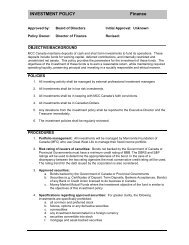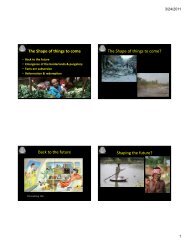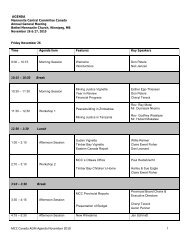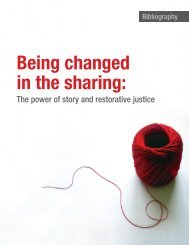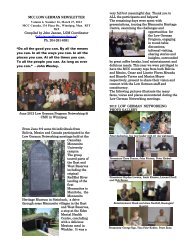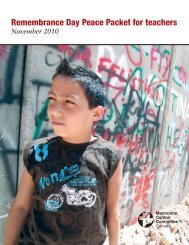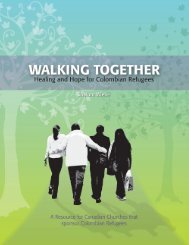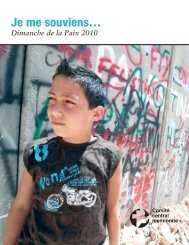to download PDF - Mennonite Central Committee Canada
to download PDF - Mennonite Central Committee Canada
to download PDF - Mennonite Central Committee Canada
You also want an ePaper? Increase the reach of your titles
YUMPU automatically turns print PDFs into web optimized ePapers that Google loves.
Jesus’ peaceful revolution<br />
MCC Peace Sunday Packet 2009<br />
®<br />
<strong>Mennonite</strong><br />
<strong>Central</strong><br />
<strong>Committee</strong><br />
<strong>Canada</strong>
Jesus’ peaceful revolution<br />
MCC Peace Sunday Packet 2009<br />
Peace Sunday is an annual opportunity <strong>to</strong> preach, teach and reflect upon the gospel<br />
of peace as proclaimed and embodied by Jesus Christ. It is a time <strong>to</strong> act and<br />
witness for peace.<br />
<strong>Mennonite</strong> <strong>Central</strong> <strong>Committee</strong> encourages Canadian Anabaptist congregations <strong>to</strong><br />
observe Peace Sunday in early November (preferably just prior <strong>to</strong> Remembrance<br />
Day). The purpose of this Peace Sunday Packet is <strong>to</strong> help congregations plan a<br />
Peace Sunday worship service and engage in peace action and witness beyond the<br />
sanctuary.<br />
This year’s theme is Jesus’ peaceful revolution. We are grateful <strong>to</strong> Scott and Mitch<br />
Mealey of Monc<strong>to</strong>n, New Brunswick for suggesting the language of “peace<br />
revolution” a number of years ago. Their slogan inspired a website for a public<br />
audience, http://iamrevolting.org.<br />
Peace Sunday is an annual<br />
opportunity <strong>to</strong> preach, teach and<br />
reflect upon the gospel of peace<br />
as proclaimed and embodied by<br />
Jesus Christ. It is a time <strong>to</strong> act<br />
and witness for peace.<br />
This year’s Peace Sunday also commemorates the anniversary of the peace but<strong>to</strong>n<br />
that says, “To remember is <strong>to</strong> work for peace.” The but<strong>to</strong>n was conceived and<br />
created in 1989 by MCC Ontario as an alternative <strong>to</strong> the Remembrance Day<br />
poppy. See the fall issue of MCC’s magazine, A Common Place, for an article<br />
about the his<strong>to</strong>ry of the but<strong>to</strong>n. This packet invites people <strong>to</strong> share their s<strong>to</strong>ries<br />
and pho<strong>to</strong>s of the peace but<strong>to</strong>n.<br />
Please send comments of evaluation regarding this year’s Peace Sunday Packet <strong>to</strong><br />
peace@mennonitecc.ca. Your feedback is essential for planning future packets and<br />
other resources. Please write, even if you use only a small portion of the packet.<br />
And if you choose not <strong>to</strong> use the packet at all, tell us why.<br />
For Jesus’ peaceful revolution,<br />
Esther Epp-Tiessen<br />
Peace Ministries Coordina<strong>to</strong>r<br />
MCC <strong>Canada</strong><br />
For additional peace resources, please visit mcc.org/canada/peace<br />
2
Introduction <strong>to</strong> theme<br />
The word revolution usually conjures up images of war and brutal violence. We<br />
think of the French revolution, the American revolution, the Russian revolution.<br />
These events all involved tremendous violence and loss of life. Revolutionaries<br />
are often thought of as people who are intent on overthrowing an existing regime<br />
with violent means.<br />
Nowadays, businesses often advertise their products as revolutionary; presumably<br />
consumers will be convinced these products are really radically new and different<br />
and will want <strong>to</strong> buy them. We hear about revolutionary razors, cleansers, cell<br />
phones, software, cars, and all kinds of other stuff.<br />
Jesus’ revolution was and is a<br />
healing, welcoming, res<strong>to</strong>ring,<br />
and reconciling revolution–it is<br />
a peaceful revolution.<br />
The word revolution has many definitions, most of them quite different from the<br />
meanings above. Revolution is the action of a planet going round in an orbit.<br />
It is the movement of any figure around an axis. It is also a sudden, radical or<br />
fundamental change; a profound shift in a way of thinking about or visualizing<br />
something. It is this last understanding of revolution that is the focus of this<br />
packet.<br />
Jesus came preaching, teaching and embodying a revolution. When Jesus announced<br />
that the Kingdom of God had arrived, he was proclaiming that a fundamental<br />
change in the world was happening. The Roman Empire world in which<br />
he lived was one characterized by tremendous social stratification, by disparities<br />
in wealth, by military occupation and by brutal violence. Jesus’ way of speaking,<br />
being, and relating <strong>to</strong> others turned that world upside down. He healed the sick,<br />
raised up the poor and weak, brought down the rich and powerful, welcomed<br />
strangers and outcasts, and reconciled enemies. His death on the cross broke the<br />
cycle of violence with loving, forgiving nonviolent resistance.<br />
Jesus’ revolution was and is a healing, welcoming, res<strong>to</strong>ring, and reconciling<br />
revolution–it is a peaceful revolution.<br />
Jesus invites us <strong>to</strong> join that peaceful revolution. When we commit our lives <strong>to</strong><br />
Christ and join his body, the church, God’s love and grace transforms us and sets<br />
us apart from the society around us. We are called in<strong>to</strong> a new way of being and<br />
living–the kind of revolutionary living that Jesus announced and lived.<br />
On Remembrance Day, our nation asks its citizens <strong>to</strong> remember those who have<br />
died through military service. Since <strong>Canada</strong> is at war in Afghanistan, there is a<br />
special focus on soldiers who are serving and fighting this current war. As followers,<br />
we remember that Jesus invites us <strong>to</strong> embody and proclaim his peaceful<br />
revolution–a new way of living in which war and violence have no part.<br />
3
Resources for Worship<br />
This section includes suggestions for the various components for Peace Sunday worship. Feel free <strong>to</strong> adapt these materials<br />
and <strong>to</strong> shape the worship service as appropriate for your congregation.<br />
1. Call <strong>to</strong> worship<br />
The following call <strong>to</strong> worship is based on Romans 12:1-2.<br />
Leader:<br />
Congregation:<br />
Leader:<br />
Congregation:<br />
All:<br />
I appeal <strong>to</strong> you therefore, brothers and sisters, by the mercies of God, <strong>to</strong> present your bodies as a living<br />
sacrifice, holy and acceptable <strong>to</strong> God, which is your spiritual worship. Do not be conformed <strong>to</strong> this world,<br />
But be transformed by the renewing of our minds,<br />
So that you may discern what is the will of God—<br />
What is good and acceptable and perfect.<br />
Thanks be <strong>to</strong> God who transforms us and transforms the world.<br />
2. Introduction <strong>to</strong> worship service<br />
The worship leader may use words like these <strong>to</strong> introduce the worship service:<br />
Today we are celebrating Peace Sunday. This is a day <strong>to</strong> worship our God who was and is and will be the first peacemaker in<br />
any and all situations. This is a day <strong>to</strong> share the good news of Jesus Christ the Prince of Peace. This is a day <strong>to</strong> give praise for<br />
the Holy Spirit who guides us and inspires us as we seek <strong>to</strong> be people of peace.<br />
Today our worship focuses on Jesus’ peaceful revolution. Jesus came preaching, teaching and embodying a revolution. The<br />
Kingdom of God that Jesus proclaimed is a peaceful revolution, a revolution where people are healed, where all have enough<br />
and no one <strong>to</strong>o much, where strangers and outcasts are welcomed, where enemies are reconciled, and where war has no<br />
place. As Jesus’ followers, we are called <strong>to</strong> join that peaceful revolution.<br />
In planning this worship service, we have made use of something called the Peace Sunday Packet which is a peace resource<br />
produced every year by <strong>Mennonite</strong> <strong>Central</strong> <strong>Committee</strong> (MCC). The Peace Sunday Packet is made available <strong>to</strong> over 700<br />
churches across <strong>Canada</strong> within the MCC constituency, and so <strong>to</strong>day we worship in solidarity with many other Anabaptist<br />
churches across our land.<br />
3. Songs and hymns<br />
Congregations rooted in the Anabaptist tradition in <strong>Canada</strong> use a variety of resources for singing in worship. They also sing<br />
in a variety of musical styles. Use the resources available <strong>to</strong> you for songs that will enhance the worship focus.<br />
4. Scripture readings<br />
The following are suggested as the primary biblical texts: Luke 6:20-36 and/or Romans 12:1-3, 9-21. You may also wish <strong>to</strong><br />
include one or more of the following Old Testament texts:<br />
Psalm 34:1-14 Depart from evil, and do good; seek peace, and pursue it.<br />
Jeremiah 7:1-7 Amend your ways and your doings, and let me dwell with you…<br />
Ezekial 36:26<br />
Micah 4:1-4<br />
A new heart I will give you, and a new spirit I will put within you…<br />
... they shall beat their swords in<strong>to</strong> plowshares…<br />
4
For the Romans passage, you may wish <strong>to</strong> have it read antiphonally, especially verses 9-21, as printed below. The passage<br />
could be read by two readers or by the two halves of the congregation.<br />
Reader 1 Reader 2<br />
Let love be genuine;<br />
Hate what is evil, hold <strong>to</strong> what is good;<br />
Love one another with mutual affection;<br />
Do not lag in zeal,<br />
Rejoice in hope,<br />
Contribute <strong>to</strong> the needs of saints;<br />
Bless those who persecute you;<br />
Rejoice with those who rejoice,<br />
Live in harmony with one another;<br />
Do not repay evil for evil,<br />
If it is possible, so far as it depends on you,<br />
Beloved, never avenge yourselves, but leave room<br />
for the wrath of God;<br />
No, “if your enemies are hungry, feed them;<br />
For by doing this<br />
Do not be overcome by evil,<br />
Outdo one another in showing honour.<br />
Be ardent in spirit, serve the Lord.<br />
Be patient in suffering, persevere in prayer.<br />
Extend hospitality <strong>to</strong> strangers.<br />
Bless and do not curse them.<br />
Weep with those who weep.<br />
Do not be haughty but associate with the lowly;<br />
do not claim <strong>to</strong> be wiser than you are.<br />
But take thought for what is noble in the sight of all.<br />
Live peaceably with all.<br />
For it is written, “Vengeance is mine, I will repay,<br />
says the Lord.”<br />
If they are thirsty, give them something <strong>to</strong> drink<br />
you will heap burning coals on their heads.”<br />
But overcome evil with good.<br />
5. Prayer of confession<br />
Compassionate Crea<strong>to</strong>r, Loving Parent,<br />
Forgive us for all the devastation we are wreaking on your beautiful and bountiful creation through our wars, our acts of<br />
terrorism and abuse, and our self-centered behaviour as individuals, communities and nations.<br />
Forgive us our cynicism and our blindness as we sit on the sidelines and say or do nothing as acts of violence occur around<br />
us.<br />
Forgive us for pointing the finger of blame at people of other faiths, nationalities or racial groups when things go wrong.<br />
Open our eyes <strong>to</strong> recognize your revolutionary way of love and peace. Open our hearts <strong>to</strong> receive it and <strong>to</strong> share it<br />
Give us courage <strong>to</strong> be peacemakers in your name, ready <strong>to</strong> follow the way of the cross rather than the tempting path of<br />
finger-pointing, war and violence.<br />
We pray this in the name of Jesus, the One who draws us in<strong>to</strong> your peaceful revolution. Amen.<br />
By Larry Kehler, adapted from Peace Sunday Packet 2005.<br />
5
6. S<strong>to</strong>ry for Children<br />
It is a challenge <strong>to</strong> speak <strong>to</strong> young children about issues of war and peace, particularly<br />
in the very short time frame that most worship services allow, in a way that is<br />
not frightening or confusing. This s<strong>to</strong>ry is geared <strong>to</strong>wards school-aged children. If<br />
your group includes a lot of pre-schoolers, it may be preferable <strong>to</strong> choose a positive<br />
and simple s<strong>to</strong>ry about peace. One timeless classic is Aesop’s fable about the sun<br />
and the wind. Check your church library or your denominational resource centre<br />
for other suggestions.<br />
Option 1<br />
Props–a poppy pin and an MCC peace but<strong>to</strong>n that says “<strong>to</strong> remember is <strong>to</strong> work<br />
for peace.” Peace but<strong>to</strong>ns are available for purchase through MCC provincial offices.<br />
...wearing the but<strong>to</strong>n is a reminder<br />
<strong>to</strong> remember all people who suffer<br />
from war, including our enemies. It<br />
is a reminder <strong>to</strong> work for peace.<br />
Invite the children <strong>to</strong> gather. Show them the poppy. Ask them what it is, if they<br />
have seen people wearing it, what does it mean? Take time <strong>to</strong> listen <strong>to</strong> their answers.<br />
Ask the school aged-children if they have participated in a Remembrance<br />
Day service at school, either this year or in past years. What are those services<br />
about? Likely they will talk about remembering soldiers and their sacrifice in war.<br />
The children may mention that the soldiers are necessary <strong>to</strong> fight and preserve our<br />
freedom. Tell them that people wear poppies <strong>to</strong> remember the soldiers at Remembrance<br />
Day—soldiers that fought in the past and soldiers that are fighting <strong>to</strong>day in<br />
Afghanistan.<br />
Then show them the peace but<strong>to</strong>n. Tell them that twenty years ago, some <strong>Mennonite</strong>s<br />
in Ontario wondered about creating an alternative <strong>to</strong> the poppy. They were<br />
people who loved Jesus very much, and believed that Jesus wants his people <strong>to</strong> live<br />
in peace <strong>to</strong>gether. Jesus taught his disciples not <strong>to</strong> hurt their enemies but <strong>to</strong> love<br />
them. That means no fighting with guns and no wars, even if we think they will<br />
protect us. Tell the children that their church is a peace church, which means that<br />
the church believes that all of us who are Jesus’ followers follow his way of peace.<br />
At Remembrance Day, many people choose <strong>to</strong> wear this but<strong>to</strong>n, instead of a poppy.<br />
Depending on your context, you may wish <strong>to</strong> acknowledge that some people will<br />
wear a poppy and a peace but<strong>to</strong>n. Tell the children that wearing the but<strong>to</strong>n is a<br />
reminder <strong>to</strong> remember all people who suffer from war, including our enemies. It is<br />
a reminder <strong>to</strong> work for peace. If appropriate for the ages of the children, give each<br />
child a peace but<strong>to</strong>n.<br />
Option 2<br />
Props–a piece of paper or cardboard with the word revolution printed on it, a sign<br />
with the words Join the peaceful revolution, a large <strong>to</strong>y gun (could be made out of<br />
cardboard), a bandana that covers most of the face, and a container in<strong>to</strong> which the<br />
sign, the gun and the bandana can fit. You will also need two partners, preferably<br />
one male and one female.<br />
Invite the children <strong>to</strong> come forward and gather around. Show them the sign with<br />
the word revolution; ask them what the word means. Take time <strong>to</strong> listen <strong>to</strong> their<br />
responses. They may respond with the idea of turning. They may respond with the<br />
idea of war. Accept both these answers. Then ask them what a revolutionary is. If<br />
there is no response, tell them that a revolutionary is someone who wants <strong>to</strong> make<br />
a revolution happen. Sometimes revolutionaries are people who want <strong>to</strong> fight with<br />
guns <strong>to</strong> make a change in their government.<br />
Invite your two partners <strong>to</strong> come and stand or sit before the children. Partner A is<br />
dressed in ordinary street clothes. Partner B has the bandana tied over his/her face<br />
6
and holds the gun. Ask the children which one looks like a revolutionary. Likely,<br />
they will identify the one with the gun; perhaps they will identify the one without.<br />
While you continue <strong>to</strong> speak <strong>to</strong> the children, Partner A can perhaps be reading a<br />
book (even the Bible!), while Partner B may move around a bit, looking this way<br />
and that, then partially hiding behind the pulpit or some chairs.<br />
Tell the children that often we think about revolutionaries as people with guns.<br />
But a revolution doesn’t have <strong>to</strong> be about guns and about fighting. Revolution basically<br />
means making a big change in the way things are. Jesus was a revolutionary<br />
in that he helped <strong>to</strong> show people a big change. He came <strong>to</strong> tell them and show<br />
them that God loved them, no matter what they were like. And he filled their<br />
hearts with love so that they could love other people <strong>to</strong>o, even their enemies. The<br />
way Jesus lived was really revolutionary. It is still revolutionary. Some people like<br />
<strong>to</strong> change the world with guns and with violence. Jesus came <strong>to</strong> change the world<br />
with love and with peace. He started a peaceful revolution. And we are part of<br />
this peaceful revolution, because we belong <strong>to</strong> Jesus.<br />
At this point, Partner A looks over <strong>to</strong> Partner B and says something like this,<br />
“Hey, Jesus loves you, do you want <strong>to</strong> join his peaceful revolution?” Partner A<br />
points <strong>to</strong> the container. He/she repeats the question or invites the children <strong>to</strong> ask<br />
it. B then slowly, thoughtfully nods at the children. He/she removes the mask and<br />
places it and the gun in<strong>to</strong> the container. He/she then pulls out of the container the<br />
sign that says “Join the peaceful revolution.” Have one of the older children read<br />
the sign. A and B then walk down the aisle, holding the sign. Stand up and invite<br />
the children <strong>to</strong> join you in following down the aisle and joining the revolution.<br />
After a couple of moments, dismiss the children <strong>to</strong> their seats.<br />
7
7. Sermon suggestions<br />
Based on Luke 6:20-36.<br />
This excerpt is sometimes called the Sermon on the Plain. It is Luke’s version of<br />
the more familiar Sermon on the Mount. Most likely, your congregation is used<br />
<strong>to</strong> hearing the Matthew version. The <strong>to</strong>ne of the Matthew version is not quite as<br />
hard-hitting. For example, it does not include the “woes” that Luke includes.<br />
These sermons of Jesus point <strong>to</strong> the ethos of the kingdom he came <strong>to</strong> proclaim.<br />
In the kingdom of God, the poor are blessed, the hungry are filled, the sorrowful<br />
laugh; at the same time those who are rich, full, and laughing now, at the expense<br />
of the poor, will have the tables turned on them. In other words, there will a<br />
leveling in the kingdom. Jesus goes on <strong>to</strong> talk about blessing those who curse you,<br />
doing good <strong>to</strong> those who hate you, even loving enemies. Jesus is describing what<br />
life is like in the kingdom, and how he expects his followers will live. In some<br />
ways, the sermon on the plain could be regarded as a manifes<strong>to</strong> for a peaceful<br />
revolution.<br />
8. Sending prayer or<br />
benediction<br />
God of perfect peace,<br />
Violence and cruelty can have no part<br />
with you. As we go from this place,<br />
give us the gift of your peace. Make<br />
us in<strong>to</strong> people of peace. Make us<br />
instruments of your peace, channels of<br />
your nonviolent love. Transform our<br />
hearts and transform our world. Make<br />
us part of your revolution of peace.<br />
Amen.<br />
Adapted from a prayer by Fr. John<br />
Dear, Peace Sunday Packet, 2006.<br />
In his day, Jesus threatened the leadership of his day by his words, actions and<br />
the authority that he commanded. Some people thought that he was a dangerous<br />
revolutionary. They thought he was a Zealot; Zealots were a kind of guerrilla<br />
movement bent upon the violent overthrow of the Roman occupation system.<br />
Because he eschewed all violence, Jesus was not a Zealot, but the kingdom he<br />
announced and the community that grew around him did embody revolutionary<br />
change. How can the church <strong>to</strong>day proclaim and embody Jesus’ peaceful revolution,<br />
particularly during a time of war?<br />
Romans 12: 1-3, 9-21<br />
Paul’s letter <strong>to</strong> the Romans was written close <strong>to</strong> the end of his long missionary<br />
life. He wrote <strong>to</strong> a small group of Christians who lived in the capital of the<br />
Roman Empire. The Roman Empire was characterized by great disparities in<br />
power and status (slavery was alive and well), an economic system that enriched<br />
a minority at the expense of the vast majority, much social unrest and ferment,<br />
and a military machine <strong>to</strong> keep agita<strong>to</strong>rs in their place. These same realities exist<br />
in our own world, though because of comfort and privilege many of us do not<br />
notice them.<br />
In his letter, Paul called on the church at Rome <strong>to</strong> a transformed life, a life guided<br />
by Christ rather than by the culture of Rome. He called them <strong>to</strong> a way of living<br />
that s<strong>to</strong>od in stark contradiction <strong>to</strong> that of the empire. One of the reasons that<br />
the early church grew so rapidly in the decades after Christ was not only because<br />
of the missionary activity of people like Paul, but because of the witness of the<br />
church <strong>to</strong> Jesus’ revolutionary new way. John Drane, Introducing the New Testament<br />
(Fortress Press, 2001), pp.381-382, writes:<br />
This is why the earliest Christians had such enormous success. When<br />
men and women asked for proof that God’s new way of doing things had<br />
truly arrived, Paul and the other apostles could point <strong>to</strong> the church. Life<br />
in the church was indeed a new society–a context in which men, women<br />
and children of diverse social, racial and religious backgrounds had been<br />
brought <strong>to</strong>gether in a new and radical friendship. Because they had been<br />
reconciled <strong>to</strong> God, they found themselves reconciled <strong>to</strong> each other. Their<br />
whole style of living was <strong>to</strong>tally transformed, and <strong>to</strong> the honest observer<br />
there could be no doubt that something of world-changing proportions<br />
had taken place.<br />
8
More resources for worship and reflection<br />
1. Incorporate a skit in<strong>to</strong> the worship service.<br />
In Romans 12:20, Paul writes <strong>to</strong> the believers at Rome that if their enemies are hungry and thirsty, they should feed them<br />
and give them drink. The idea of feeding the enemy is found in other passages of scripture: 1 Samuel: 1-36 tells the s<strong>to</strong>ry of<br />
how Abigail fed King David and his companions so that they would not kill her husband. In 2 Kings 6:1-23 Elisha instructs<br />
the king of Israel <strong>to</strong> feed the army of his enemy the king of Aram. Proverbs 25:21-22 offers the simple counsel, “If your<br />
enemies are hungry, given them bread <strong>to</strong> eat; and if they are thirsty give them water <strong>to</strong> drink…”<br />
The s<strong>to</strong>ry of Abigail is available from MCC in skit form. If you would like a copy of the skit, please send your request <strong>to</strong><br />
peace@mennonitecc.ca.<br />
2. Incorporate a litany of resistance and affirmation.<br />
As a congregational response <strong>to</strong> the meditation or sermon, you may wish <strong>to</strong> incorporate a litany of response and commitment.<br />
In the spirit of revolution, this litany should include both elements of resistance (saying no) and affirmation (saying<br />
yes). It should be read boldly and with strong conviction. Here is a sample, loosely based on Romans 12:<br />
Leader:<br />
Congregation:<br />
Leader:<br />
Congregation:<br />
Leader:<br />
Congregation:<br />
Leader:<br />
Congregation:<br />
Leader:<br />
Congregation:<br />
Leader:<br />
Congregation:<br />
All:<br />
Jesus draws us in<strong>to</strong> his peaceful revolution, a revolution where God’s love, goodness, hope and peace<br />
transform us and our world.<br />
With God’s grace and power, we will revolt against hatred, and seek <strong>to</strong> be loving <strong>to</strong>wards all.<br />
Jesus draws us in<strong>to</strong> his peaceful revolution—<br />
With God’s grace and power, we will revolt against injustice, and seek <strong>to</strong> live justly with all.<br />
Jesus draws us in<strong>to</strong> his peaceful revolution—<br />
With God’s grace and power, we will revolt against violence, and seek <strong>to</strong> live peaceably with all.<br />
Jesus draws us in<strong>to</strong> his peaceful revolution—<br />
With God’s grace and power, we will revolt against fear, and seek the love that casts out all fear.<br />
Jesus draws us in<strong>to</strong> his peaceful revolution—<br />
With God’s grace and power, we will revolt against warfare, and will seek <strong>to</strong> live and proclaim peace,<br />
Jesus draws us in<strong>to</strong> his peaceful revolution—<br />
With God’s grace and power, we will revolt against evil, and seek <strong>to</strong> overcome evil with good.<br />
Thanks be <strong>to</strong> God who transforms us and our world!<br />
9
3. Tell some peaceful revolution s<strong>to</strong>ries.<br />
This section includes s<strong>to</strong>ries of individuals and communities who could be called peaceful revolutionaries. These people have<br />
embraced the call <strong>to</strong> join the peaceful revolution. The s<strong>to</strong>ries may be incorporated in<strong>to</strong> a sermon, reprinted in a church newsletter,<br />
or discussed in a Sunday school class or youth activity.<br />
Menno Simons, Holland, 1496-1561. As a Roman Catholic priest in 16th century Holland, Menno Simons began <strong>to</strong> have doubts<br />
about his church’s practice of infant baptism and the Lord’s Supper. He did not leave the church immediately, but continued<br />
<strong>to</strong> preach and develop his ideas. In January of 1536 he left his position in the Catholic church and soon became a prominent<br />
leader among the Anabaptists in Holland as they sought a faith renewal based on the beliefs and practices of the early<br />
Christian church. Menno wrote extensively about biblical theology and discipleship, and he was one of the first Anabaptists<br />
<strong>to</strong> present and explain the peace position as an integral part of Christian faith. Despite the ongoing threat of persecution, he<br />
persisted as a leader within this fledgling group of “Mennists” who later became known as <strong>Mennonite</strong>s. Menno wrote:<br />
The regenerated do not go <strong>to</strong> war nor engage in strife. They are the children of peace who have beaten their swords<br />
in<strong>to</strong> plowshares and their spears in<strong>to</strong> pruning hooks and know of no war… Since we are <strong>to</strong> be conformed <strong>to</strong> Christ,<br />
how can we then fight our enemies with the sword?<br />
From MCC Peace Sunday Packet, 2003.<br />
MB Church of Kitwit, Congo, 1996. In late 1996 a guerrilla movement led by Laurent Kabila moved from southeastern Congo<br />
<strong>to</strong>wards the capital, Kinshasa, in an attempt <strong>to</strong> overthrow the corrupt and dicta<strong>to</strong>rial regime of President Mobu<strong>to</strong> Sese Seko.<br />
Along the way, the guerrillas engaged Mobutu’s army in battle and skirmishes; the army fell apart and <strong>to</strong>ok out its fury on<br />
local villages with killing, rape and pillage.<br />
Kikwit, a community 500 kilometers east of Kinshasa prepared for the onslaught. The MB churches gathered <strong>to</strong> pray and<br />
brains<strong>to</strong>rm how they could respond <strong>to</strong> the impending violence. They developed a plan, pitched it <strong>to</strong> the mayor, who accepted<br />
it, and they went <strong>to</strong> work <strong>to</strong> try <strong>to</strong> keep their community safe.<br />
When the troops arrived a month later, volunteers met them before they could cross the bridge in<strong>to</strong> Kikwit. They greeted the<br />
soldiers with welcome songs, and gave them food, shoes, clothes and medicines collected from city residents. Business people<br />
provided vehicles <strong>to</strong> transport the goods over the bridge and <strong>to</strong> take the troops out of the area. Additionally, teams of trained<br />
and unarmed youth (20 teams of 100 each) patrolled five main streets, intervening nonviolently when someone needed protection.<br />
Only one life was lost.<br />
The witness of the church <strong>to</strong> the gospel of peace did not go unnoticed. The church continues <strong>to</strong> grow.<br />
Adapted from “A lesson in peacemaking,” <strong>Mennonite</strong> Brethren Herald, 14 November 2003.<br />
Milk for a baby, Serbia 1992. Chris Hedges, a war correspondent, tells the s<strong>to</strong>ry of Rosa and Drago Sorak, a Bosnian Serb<br />
couple in the <strong>to</strong>wn of Gorazde in 1992. Rosa and Drago suffered greatly from the war and their isolation as a Serb family<br />
surrounded by Muslims. Their two sons were killed, they suffered death threats, and the <strong>to</strong>wn was repeatedly shelled. They<br />
had no electricity, gas, or water. In this desperate situation, they had a little baby girl. Food was scarce and Rosa could not<br />
breastfeed. Infants were dying everywhere, and their little girl weakened.<br />
One morning there was a knock on the door. There s<strong>to</strong>od a Muslim neighbour, Fadil Fejzic, with half a liter of milk for their<br />
baby. Fadil milked his cow at night <strong>to</strong> avoid being killed by snipers. Every morning for the next 442 days, Fadil suffered the<br />
insults and threats of his own Muslim community <strong>to</strong> take half a liter of milk <strong>to</strong> the young Serb infant. War finally forced<br />
Rosa and Drago <strong>to</strong> move <strong>to</strong> another community, and Fadil eventually lost his cow <strong>to</strong> the Serb forces, but they survived the<br />
war. And the baby lived.<br />
Adapted from Chris Hedges, War is a force that gives us meaning (New York: Public Affairs, 2002, pp. 51-53.<br />
10
By the side of the road, Saskatchewan, 2004. A few years ago a young woman named Donna began attending a <strong>Mennonite</strong><br />
church in Saska<strong>to</strong>on, Saskatchewan. She was very new in the Christian faith. One Sunday, after hearing a guest preach on<br />
the gospel of peace, Donna was driving on the highway with her infant son. She noticed a car s<strong>to</strong>pped on the side of the road<br />
and two people standing beside it. As she got closer, she realized the man and woman were arguing. She remembered the<br />
speaker at church who had <strong>to</strong>ld the s<strong>to</strong>ry about knocking on an apartment door where she heard yelling, then asking, “Is<br />
everything okay? Can I do anything <strong>to</strong> help?”<br />
Donna struggled with whether or not <strong>to</strong> s<strong>to</strong>p her car. She had her son with her and was obviously concerned for her safety.<br />
But as she drove past, she looked in the rearview mirror and saw the man strike the woman. Donna slowed her car, turned<br />
around, and went back, all the while praying hard. She s<strong>to</strong>pped by the car and asked, “Is everything all right? Can I do<br />
anything <strong>to</strong> help?” The man suggested that everything was okay, but the woman came over <strong>to</strong> Donna’s car and said that everything<br />
was not okay. Donna offered <strong>to</strong> drive her <strong>to</strong> Saska<strong>to</strong>on. Meanwhile, the man became quite contrite, and after some<br />
time, convinced the woman <strong>to</strong> go with him. Donna had her university day planner on the front seat of the car and ripped out<br />
the page with emergency numbers on it. She gave it <strong>to</strong> the woman saying, “No matter what you did, you don’t deserve <strong>to</strong> be<br />
hit. Please call someone for help.”<br />
As shared by Eileen Klassen Hamm, MCC Saskatchewan<br />
To carry a gun, Ontario, 2009. Anneliese Jaeger-Friesen became a Christian and was baptized in the spring of 2007. She had been<br />
employed as a Border Services Officer with the Canadian Border Service Agency (CBSA) for a number of years. In 2008 she<br />
gave birth and went on a maternity leave. While on leave, the CBSA implemented new regulations that required all Border<br />
Services Officers <strong>to</strong> carry a firearm while on duty. Until this time, cus<strong>to</strong>ms officers had always been unarmed.<br />
The new regulations presented Anneliese with a tremendous dilemma. As a new Christian, she was passionate about her<br />
faith and about her commitment <strong>to</strong> Jesus’ way of peace. She felt that learning <strong>to</strong> use and carry a gun would violate these<br />
deeply held convictions. At the same time, she loved her job and didn’t want <strong>to</strong> leave it.<br />
With much reflection and prayer, and with the help of her pas<strong>to</strong>r at the Niagara United <strong>Mennonite</strong> Church and others, Anneliese<br />
prepared a statement for her employer and requested a meeting with her manager. She asked that she be allowed <strong>to</strong><br />
keep her job but that she be exempted from the requirement <strong>to</strong> carry a gun and other use-of-force <strong>to</strong>ols.<br />
In the end, Anneliese was offered a position in another department of CBSA, where her convictions would not be compromised.<br />
She was happy with this resolution <strong>to</strong> her dilemma. She agreed <strong>to</strong> share her s<strong>to</strong>ry <strong>to</strong> help people understand that we<br />
can be witnesses for the peace of Jesus <strong>to</strong>day and in <strong>Canada</strong>, even when we seem <strong>to</strong> be far away from conflict and war situations.<br />
As shared by Anneliese Jaeger-Friesen, Niagara-on-the-Lake, Ontario<br />
11
3. Reflect on these revolutionary quotations.<br />
The following quotations may be used in a sermon, incorporated in<strong>to</strong> the Peace<br />
Sunday bulletin or your congregation’s newsletter.<br />
No revolution that has ever taken place in society can be compared <strong>to</strong> that which<br />
has been produced by the words of Jesus Christ.<br />
Mark Hopkins<br />
The old world can never get out of its tailspin of violence, but the cross of Christ<br />
is where a new world has begun which puts an end <strong>to</strong> the need for that cycle.<br />
That new world is now here and it is coming. And the church of peace is that<br />
community that has been called <strong>to</strong> live according <strong>to</strong> the new pattern of the cross<br />
in the world.<br />
Lay<strong>to</strong>n Friesen<br />
If we have no peace, it is because we<br />
have forgotten that we belong <strong>to</strong> each<br />
other.<br />
Mother Teresa<br />
If we have no peace, it is because we have forgotten that we belong <strong>to</strong> each other.<br />
Mother Teresa<br />
Everyday I am afraid that [Jesus] died in vain because he is buried in our churches,<br />
because we have betrayed His revolution in obedience and fear of authorities...<br />
from a creed shared by Dorothee Soelle<br />
Sometimes all the peacemakers need <strong>to</strong> do is practice revolutionary patience and<br />
steadfast hope, for the universe bends <strong>to</strong>ward justice, and the entire Christian<br />
s<strong>to</strong>ry demonstrates the triumph of love.<br />
Shane Claiborne<br />
…women who have brought men in<strong>to</strong> the world and nurtured them until they<br />
reach the age of fighting must experience a peculiar revulsion when they see them<br />
destroyed, irrespective of the country in which these men have been born.<br />
Jane Addams, 1931 Nobel Peace Prize recipient<br />
The manner in which we pursue peace is, in fact, the peace…<br />
Ruth Krall<br />
Those of us who live by the convictions of love for the friend and foe, the life<br />
of nonviolence, also are invited <strong>to</strong> remind ourselves that our myth that love can<br />
and will overcome is only convincing when it is grounded in real life and actions.<br />
Ours is a living s<strong>to</strong>ry. It is not yet complete. Words strike the opening chord, but<br />
the symphony is completed with action.<br />
Gene S<strong>to</strong>ltzfus<br />
12
Resources for Witness and Action<br />
1. Hold a public witness<br />
Remembrance Day is a time when our nation acknowledges the pain and suffering<br />
caused by war, but it also holds up the necessity of war. Because <strong>Canada</strong><br />
is currently involved in war in Afghanistan, there is a special emphasis on how<br />
soldiers and war-fighting are necessary for the preservation of peace and freedom.<br />
Peace churches, however, live by a different s<strong>to</strong>ry and a different vision. They live<br />
by the s<strong>to</strong>ry and vision of Jesus and his peaceful revolution, of the Kingdom of<br />
Heaven on earth, of a world without violence and without war, of a world that<br />
builds peace through peaceful means. This vision is one <strong>to</strong> be shared and proclaimed.<br />
MCC encourages congregations<br />
not only <strong>to</strong> observe a Peace<br />
Sunday worship service, but <strong>to</strong><br />
engage in some form of public<br />
witness for peace during the<br />
Remembrance Day season.<br />
MCC encourages congregations not only <strong>to</strong> observe a Peace Sunday worship<br />
service, but <strong>to</strong> engage in some form of public witness for peace during the Remembrance<br />
Day season. This could include a letter <strong>to</strong> the edi<strong>to</strong>r, a meeting with a<br />
Member of Parliament, or a public prayer vigil. It could also include sponsoring<br />
an ad in your local newspaper or in a public place.<br />
MCC Ontario has prepared extensive materials for a public prayer vigil for peace<br />
during the Remembrance Day season. These materials include prayers, readings<br />
and songs, as well as detailed instructions for the planning and logisitics of the<br />
vigil. These materials are posted at http://canada.mcc.org/peacesunday<br />
Other suggestions and how-<strong>to</strong>’s for public witness may be found in Public Witness<br />
for Peace: A Toolkit for Christians, produced by MCC. http://mcc.org/canada/<br />
peace/resources/<strong>to</strong>olkit.pdf<br />
Additionally, ask your denominational conference office for peace witness resources.<br />
2. Celebrate the peace but<strong>to</strong>n, “To remember is <strong>to</strong> work for<br />
peace.”<br />
Twenty years ago, MCC Ontario produced an alternative <strong>to</strong> the Remembrance<br />
Day lapel poppy. It was a red but<strong>to</strong>n with the phrase, “To remember is <strong>to</strong> work<br />
for peace.” The purpose of the but<strong>to</strong>n was <strong>to</strong> offer a gentle but clear peace message<br />
in the context of remembrance of war. The but<strong>to</strong>n has changed a bit in appearance<br />
but hundreds of but<strong>to</strong>ns are still sold every year.<br />
This year MCC is honouring the anniversary of this but<strong>to</strong>n by inviting people <strong>to</strong><br />
share their s<strong>to</strong>ries and pho<strong>to</strong>s of someone wearing the but<strong>to</strong>n. Visit canada.mcc.<br />
org/peacesunday <strong>to</strong> read some of the s<strong>to</strong>ries and see the pho<strong>to</strong>s. Send your s<strong>to</strong>ries<br />
and pho<strong>to</strong>s <strong>to</strong> peacebut<strong>to</strong>ns@mennonitecc.ca.<br />
Send your Member of Parliament a peace but<strong>to</strong>n. Let him/her know how you are<br />
living for peace. Ask him/her <strong>to</strong> remember and <strong>to</strong> work for peace <strong>to</strong>o.<br />
You may order but<strong>to</strong>ns from your provincial MCC office. For contact information,<br />
visit http://mcc.org/contact/canada.html.<br />
13
3. Explore the concept of revolution.<br />
Have your group brains<strong>to</strong>rm all the ways that they have heard the word revolution; e.g. google revolution, dance dance<br />
revolution, French revolution, Twitter revolution. Or consider popular songs that contain messages of revolution, e.g. the<br />
Beatles’ “talking ‘bout a revolution,” Bob Dylan’s “the times are a changing,” and much more recent ones such as Bruce<br />
Springsteen’s “The rising” or Steve Earle’s “Jerusalem.” How do these revolutions relate <strong>to</strong> Jesus’ revolution?<br />
Read Luke 6:20-36, Roman 3:1-3, 9-21 or other scripture texts. Learn about the Greek word metanoia, which means<br />
conversion or turning, and how it is used in the New Testament. How do conversion and revolution relate? How did Jesus<br />
embody revolution? Do you think Jesus’ peaceful revolution changed the world? Is it still changing the world? What are<br />
ways that your group can offer a revolutionary witness <strong>to</strong> your community?<br />
4. Remember peaceful revolutionaries<br />
Read some of the s<strong>to</strong>ries included in this packet about people who were or are peaceful revolutionaries. Which s<strong>to</strong>ries resonate<br />
with your group? Which s<strong>to</strong>ries do not? What s<strong>to</strong>ries can members of the group contribute?<br />
Mahatma Gandhi is frequently identified as one of the key leaders of peace and nonviolent action in the 20th century. Gandhi<br />
was a Hindu. He said something like this, “The only people who don’t know that Jesus was nonviolent are Christians.”<br />
How do you respond?<br />
5. Create a peaceful revolution video<br />
Visit the MCC website called http://iamrevolting.org. Read the materials and view the videos about s<strong>to</strong>pping war, living<br />
simply and sustainably and transforming conflict. Imagine how you and your group could embody the peaceful revolution<br />
in your community. Write a s<strong>to</strong>ry about what you have done. Send it <strong>to</strong> peace@mennonitecc.ca and we will post it on the<br />
website. OR have your group create its own video (no more than three minutes) that would be fitting for the peaceful revolution<br />
website. Send a note <strong>to</strong> peace@mennonitecc.ca that you are doing this. All contribu<strong>to</strong>rs whose videos are chosen for the<br />
website will receive a peaceful revolution t-shirt.<br />
14
Even more resources<br />
Books<br />
Brown, Tricia Gates, ed. Getting in the Way: S<strong>to</strong>ries from Christian Peacemaker Teams. Herald Press, 2005.<br />
Claiborne, Shane. The Irresistable Revolution. Zondervan, 2006.<br />
Friesen, Friesen, Duane K. and Gerald Schlabach, eds. At Peace and Unafraid: Public Order, Security, and the Wisdom of the<br />
Cross. Herald Press, 2005.<br />
Holsopple, Mary Yoder, Ruth E. Krall, and Sharon Weaver Pittman. Building Peace: Overcoming Violence in Communities.<br />
WCC Publications, 2004.<br />
Maclaren, Brian D. Everything Must Change: Jesus, Global Crisis and a Revolution of Hope. Thomas Nelson, 2007.<br />
Roth, John D. Choosing Against War: A Christian View. Good Books, 2002.<br />
Trocmé, André. Jesus and the Nonviolent Revolution. Orbis Books, 2004. Available for <strong>download</strong> at http://www.plough.com/<br />
ebooks/nonviolentrevolution.html.<br />
Yoder, John Howard. The Politics of Jesus. Revised edition. Eerdmans, 1994.<br />
MCC Resources<br />
At each small turn, choose peace. A postcard that identifies 10 daily practices that build peace. Available from provincial MCC<br />
offices or from http://www.tng-secure.com/scripts/mcc/catalog/result.php#.<br />
Choose your own adventure? A 12-page zine offers youth 10 questions <strong>to</strong> consider before joining the military. Available from<br />
MCC Ontario and MCC <strong>Canada</strong>.<br />
Pursuing Peace: The Essence of <strong>Mennonite</strong> <strong>Central</strong> <strong>Committee</strong>. Revised edition. MCC <strong>Canada</strong>, 2009. Available for purchase<br />
for $4.65 at http://secure.mcc.org/mccs<strong>to</strong>re/index.php?main_page=product_info&cPath=6_11_38&products_id=366.<br />
To remember is <strong>to</strong> work for peace. MCC’s peace but<strong>to</strong>n. Available for $1.00 from provincial MCC offices (reduced prices for<br />
bulk purchases). For addresses and phone numbers, go <strong>to</strong> http://mcc.org/contact/canada.html<br />
MCC websites<br />
MCC <strong>Canada</strong>’s peace ministries program. http://mcc.org/canada/peace<br />
Join the peaceful revolution. http://iamrevolting.org<br />
MCC provincial peace program websites:<br />
Alberta<br />
British Columbia<br />
Ontario<br />
http://mcc.org/alberta/programs/peace.html<br />
http://mcc.org/bc/peace<br />
http://mcc.org/ontario/peaceeducation<br />
15
<strong>Mennonite</strong><br />
<strong>Central</strong><br />
<strong>Committee</strong><br />
®<br />
MCC Alberta<br />
#210, 2946 - 32nd Street NE, Calgary, AB T1Y 6J7<br />
(403) 275-6935<br />
MCC British Columbia<br />
31414 Marshall Road, Box 2038, Abbotsford, BC V2T 3T8<br />
(604) 850-6639<br />
MCC <strong>Canada</strong><br />
134 Plaza Drive, Winnipeg, MB R3T 5K9<br />
(204) 261-6381<br />
MCC Mani<strong>to</strong>ba<br />
134 Plaza Drive, Winnipeg, MB R3T 5K9<br />
(204) 261-6381<br />
MCC Maritimes<br />
27 John Street, Monc<strong>to</strong>n, NB E1C 2G7<br />
(506) 383-9339<br />
MCC Newfoundland and Labrador<br />
Box 850, Station B, Happy Valley, NL A0P 1E0<br />
(709) 896-3213<br />
MCC Ontario<br />
50 Kent Avenue, Kitchener, ON N2G 3R1<br />
(519) 745-8458<br />
MCC Québec<br />
1212, rue du Fort, Montréal, QC H3H 2B3<br />
(514) 278-3008<br />
MCC Saskatchewan<br />
600-45th Street West, Saska<strong>to</strong>on, SK S7L 5W9<br />
(306) 665-2555<br />
Call your nearest office in <strong>Canada</strong><br />
<strong>to</strong>ll free 1-888-622-6337.<br />
mcc.org



